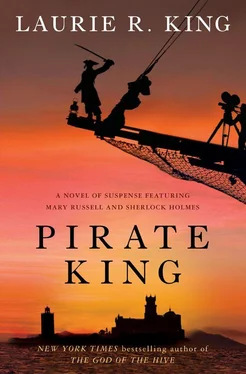Four hours later, Hale had filled three of the eighteen parts, two of whom would only be adequate for the dim recesses of a pirate horde. Sounds from backstage made it clear that the afternoon’s performance was about to get under way. Hale told Pessoa to inform the would-be pirates that the process would resume the following morning, and two sets of irritated theatre-folk grumbled past each other, one onto the stage, one off.
Fflytte decided to stay for a time to watch the performance, on the chance that he could steal a few of its players, but five minutes was enough: There is not sufficient make-up in the world to turn a Portuguese comic actor into a Barbary pirate.
Out on the street, the director stormed away, talking furiously to his friend and assistant, Hale. They made an odd pair, since Hale did not bother himself with the foot of height he had over Fflytte, but walked straight-backed at the small man’s side, one slow pace for every two of the director’s. Pessoa trailed behind, unsure if his services would be required. I followed after, examining the city around me.
In the fifteenth century, Portugal had become the world’s first truly global empire, planting its flag on four continents, beginning with Ceuta, just across the Mediterranean, and stretching to Macao in one direction and São Paulo in the other. Lusitania to the Romans, Portucale to the Moors, and troublesome to all, at its peak the pugnacious little country had possessed sea-borne chutes that filled royal coffers to overflowing with gold and spices and power, its Navy making full use of the enormous harbour at Lisbon’s door. Now, its heyday well past, Portugal was a small country with a robust sense of importance, giving one the impression that its walls hid untold riches.
Most of which description would also apply to Randolph St John Warminster-Fflytte, come to think of it.
Craning my neck at an ornate façade overhead, I promptly walked into a man crouched on the pavement tapping stones into place. Reeling away from him, I collided with our translator’s outstretched hand, pointing in the direction of the water.
“An interesting idea,” Hale was saying. He sounded dubious.
“A great idea,” Fflytte corrected him. “We should’ve thought of it ourselves.” Meaning: You should have.
“They’d be rank amateurs,” Hale countered.
“Sorry,” I cut in. “What is this idea?”
“This chap said – well, you tell her.”
Pessoa inclined his head. “I merely suggested that if Senhor Fflytte requires men who look like pirates, he might wish to search among the sea-folk rather than among those who make their living in the theatre.”
“It’s a great idea,” Fflytte repeated.
“An interesting possibility,” Hale mused.
I could not imagine that this would end well.
ALL [ kneeling ]: Hail, Poetry, thou heaven-born maid! Thou gildest e’en the pirate’s trade.
13 November
Lisbon
My dear Holmes,
The ides of November have come. And are (I fear) far from over. The next time you see Lestrade, you can tell him he owes me three weeks on a warm beach somewhere, by way of repayment for this.
It’s a madhouse. I knew before ever I left Sussex that the situation would be a lunatic one, but who would have suspected that every person I have met since my London interview with Geoffrey Hale ought to be lodged in Bedlam?
Beginning with Fflytte himself. His Christian name might as well be Napoleon for all his megalomania, with the stature to match. His films are, to his mind, the defining markers of the modern age, and require from each and every one of his small army of experts the scrupulous attentions of a Fabergé enamellist.
I discovered him on the ship – in one of its calmer moments, when I was not stretching my torso over the railings – deep in a discussion with the third-mate concerning the proper hand position to be used in a knifefight. I’ll grant that all signs testified to the sailor’s experience with knifefights; however, his missing ear, notched eyebrow, and scar-striped forearms did not have much to say for his expertise. I was tempted to correct the man’s lecture, but decided that knifefights were not included in my job description, and made do with a gentle remonstration, pointing out that shedding First Class blood would be a sure guarantee of never working on a passenger ship again.
Had I followed my initial impulse and stepped forward to demonstrate, Fflytte would no doubt have contrived to write a female pirate into the script.
That demented attention to detail pervades the enterprise. Evenings on board the steamer began well enough, but as soon as the weather permitted use of the deck, Fflytte had a projector set up there, and my quiet evenings were taken over by screenings of at least three moving pictures a night, each of which had portions re-played at the demands of one or another member of the company: Our “Isabel’s” mother wished to repeat a scene in which her young daughter appeared – three times over; Mabel had many remarks concerning the actress in The Flapper; and in – why have I not seen this picture before? – Sherlock Jr, Buster Keaton climbs into a cinema screen and becomes a detective. Several of its scenes are now etched indelibly onto my mind’s eye, as our cameraman wished to re-examine the (admittedly clever) effects.
Did I say that attention to detail pervades every aspect of the enterprise? That is not strictly true: rather, every aspect of it except those that might actually be of benefit.
For example, might not someone have noticed early on that Portugal is on the brink of some kind of revolution? That its capital city might not be the ideal place to drop a film crew? That a movie about pirates does not require convenient access to bread riots and clashes between the Army and the National Guard? (Although should we be so fortunate as to experience an uprising as we go our way in the streets of Lisbon, you can be certain that the cameras of Fflytte Films will capture every moment of it.)
Similarly, the cast. We have brought with us all the English characters, from Frederic to the Major-General, managing successfully to keep the daughters (thirteen of the creatures – even W. S. Gilbert would have quailed) from falling overboard, or falling into bed with one of the sailors. Having hastily read Gilbert’s libretto before we left, I protested to Fflytte that since all the opera’s pirates turn out to be English noblemen fallen on hard times, we needed only hire Englishmen – and could even avoid sailing to Morocco altogether (yes, we are headed there next) by sticking to the original story, which takes place entirely in Penzance. I might have convinced him, had he not remembered that he was not making a movie about The Pirates of Penzance, but a movie about a movie about The Pirates of Penzance, and because his fictional movie crew goes to Lisbon to hire its pirates, so must we. (Is your head spinning yet, Holmes?) The logical next question being, if the fictional movie crew is, in point of fact, fictional, could not we adjust chosen elements of the fiction?
No.
(Did I say three weeks on a warm beach? A solid month, I think, will be required.)
In my brief hours between being hired by Hale and leaping with my valise onto the departing steamer, I had no spare minute to hie me to a bookseller, and thus my choice was limited to the three books I had brought from Sussex, supplemented by offerings from some of the film company and some well-thumbed novels from the ship’s library. As one can only bear so much Ethel M. Dell, and even I cease to discover new revelations in the Holy Writ after an unrelieved diet of it, I seized on a Defoe title that I had last read as a child.
Читать дальше












